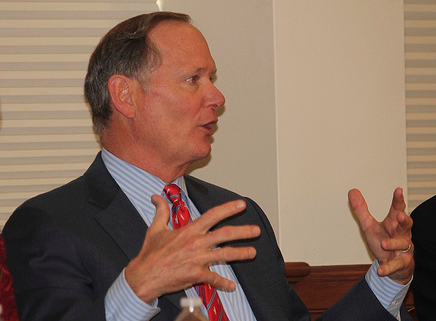NCAA Soft On Miami, Continues To Insult USC

Four weeks ago, I wrote an article regarding the NCAA's injustice in reducing Penn State's sanctions and keeping USC's in tact. Today, it pains me that I need to write another such piece. This time, the NCAA's blatant favoritism became evident through its handling of the Miami scandal. When the penalties were handed down to USC following the Reggie Bush recruiting violations, the NCAA set the precedent that all teams who follow suit will endure the same penalties: scholarship reductions and a bowl ban, the latter of which has crippled some of USC's most recent recruiting classes. Today, however, when Emmert and the NCAA announced the sanctions that the Hurricanes will endure over the next few years, the bowl ban was noticeably absent. Miami's offenses must not have been to the extent that USC's were then, right? Wrong.
In the report released October 22nd by the NCAA, it was released that in Miami "approximately 30 student-athletes were involved with the booster." Moreover, "several football coaches, three men’s basketball coaches and two athletics department staff members were also involved in the case." In USC's case, the scandal involved two players: Reggie Bush and O.J. Mayo.
Furthermore, the report about Miami filed by the NCAA was 102 pages long whereas USC's was finished in only 67 pages. Why then would the penalties be so different?
SEE MORE: NCAA To Gradually Lift Penn State Sanctions
Miami will have nine scholarships taken away over the next three years while USC has endured the loss of 30.
USC had the 2004 National Championship vacated, all of the football wins earned in 2005 wiped away, and all of the 2007-2008 basketball victories erased. Miami, on the other hand, has had no wins vacated.
USC football was forced to sit out of postseason play for two years in 2010 and 2011 and the basketball program was ineligible to participate in March Madness in 2010. For Miami? No postseason ban at all.
When the NCAA issued the harshest penalties ever to USC, they crippled the program. The thirty scholarships have taken a toll on the depth of the Trojans' lineup, and the bowl ban scared away many prospects who dreamed of winning a National Championship. Nine scholarships taken away from the Hurricanes will hardly do anything to Miami, who, over the past few years, have put together top-notch recruiting classes. Miami's 2014 recruiting class is ranked fifth in the nation, boasting the most five star recruits in the nation.
Miami is still very much in the hunt for the National Championship, and these sanctions, unlike the ones handed down to USC, will have no lasting effects on the Hurricanes football and basketball programs. To defend the soft penalties that were levied on Miami, the NCAA cited Miami's compliance with the investigation and the Hurricanes' self-imposed postseason ban over the past two seasons during which Miami went 6-6 and 7-5. The NCAA commended Miami on choosing to sit out of the "Who Cares Bowl" which Miami would have been eligible for with those records. USC was forced to sit out of the postseason after an 10-2 season in 2011.
The simple fact is that the NCAA just keeps adding insult to injury for Southern Cal. When USC tried to appeal their sanctions following the Penn State penalty reductions, the NCAA claimed that there was "no comparison between USC and Penn State." Now, Mark Emmert has been presented with a case that not only compares to USC, but one that is exactly the same and worse than USC's, yet there has still been no change in USC's sanctions, and frankly, it is probably too late. In response to the situation with Miami, USC's athletic director Pat Haden said "We have always felt that our penalties were too harsh. This decision (on Miami) only bolsters that view. Beyond that, we have no further comment."
At the end of the day, the NCAA has gone from bad to worse. The reduction of the Penn State penalties were bad enough, but the Miami case has done nothing but show the inconsistencies with the NCAA's decisions to punish programs. They set a precedent with USC, and failed to follow it in their dealings with Miami. While USC's campus is once again enraged at getting the short end of the stick, at this point they've almost gotten used to it, and that is the true problem.



